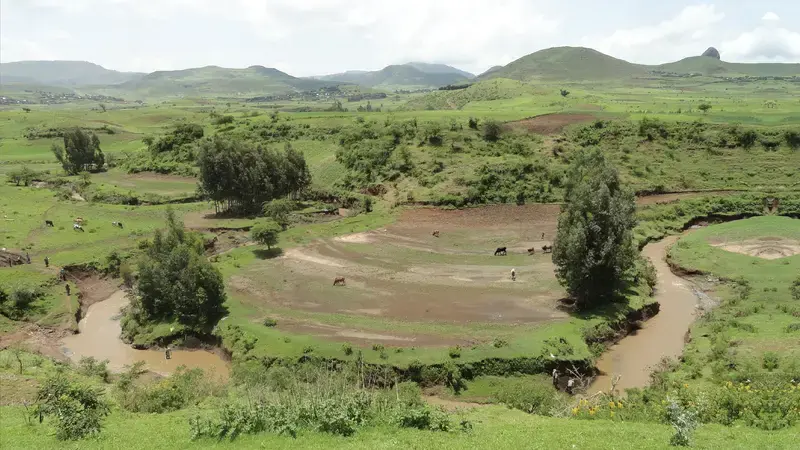An Integrated Watershed Approach to Mitigating Land Degradation and Improving Livelihoods

Ethiopia has tremendous agricultural potential with vast areas of fertile land, diverse climate, abundant rainfall and a large labor force. Yet agriculture remains underdeveloped and poverty persists, especially in rural areas. Drought continues to affect the country, causing considerable damage to rain-fed agriculture. Severe famines have greatly affected the lives of the people and have also hampered socio-economic development. In the Amhara region of Ethiopia, people remain poor because the country has not capitalized on its agricultural potential. Crop yields are low despite high seasonal rainfall. Rainfall is uncertain, uneven, and erratic. Soil erosion-induced land degradation poses a serious threat to food security in Ethiopia’s highlands.
In a new book, “Mitigating Land Degradation and Improving Livelihoods: An Integrated Watershed Approach,” edited by ICARDA scientists, Dr. Feras Ziadat and Dr. Wondimu Bayu, details how an integrated ‘systems’ approach to farming in the watershed context increases the effectiveness of a production system and improves people’s livelihoods. The book breaks down the results of a watershed management research-for-development project in the Gumara-Maksegnit watershed, located in the upper catchment of the Blue Nile River and Lake Tana basin, in the northwest of Ethiopia.
The integrated watershed management and monitoring approach focused on improving the livelihoods of local communities, through improving agricultural productivity and conserving ecosystem resources by integrating affordable and appropriate technologies in a favorable socio-economic environment. ICARDA scientists argue that an integrated systems approach is the only way to ensure that the full potential of a watershed is realized, without causing damage or degradation to other locations. Focusing on one type of crop or one approach to water harvesting will have an impact on other parts of the watershed system. The development approach encourages planners and donors of food security programs to think and develop their work with communities in new ways. This ‘systems thinking’ brings long-term benefits, especially for people living in fragile and severely degraded landscapes like the Amhara region.
The book uses a range of connected studies, conducted with the active participation of the farming community and relevant stakeholders, such as the local offices of agriculture and extension services. The work was conducted on the premise that previous efforts to solve farming system constraints using a piecemeal approach or discipline-specific focus have not been successful. Addressing agricultural and environmental constraints through a holistic approach enables the generation of comprehensive technologies to sustainably improve the natural resource base and the livelihoods of communities.
The integrated watershed management research approach has received considerable attention in Ethiopia due to its severe land degradation in many unprotected watersheds. Despite the importance of watershed projects in promoting rural development and natural resource management, little information on successes and failures from watershed research and development interventions have been shared.
ICARDAs partnership with organizations in Ethiopia and Austria have generated practical lessons and a framework for better managing upland watersheds on marginal lands in food production systems, which can be applied to improve water, land and crop productivity in other similar areas.
The book also details the unique methodology developed for the selection of suitable fields and farmers to implement new approaches or improved technologies, to achieve production increases while reducing degradation of sensitive agro-ecosystems. The authors also demonstrate how the watershed scale is a valuable basis for assessing the protection of fragile land resources. Published by Routledge (Taylor & Francis Group) in 2015, the book is available for purchase on the Routledge website.
